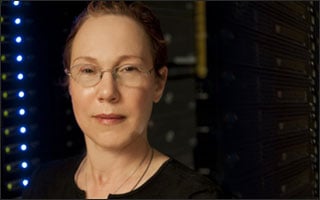Rachel Karchin, assistant professor of the Department of Biomedical Engineering and the Institute for Computational Medicine, and colleagues have created a computer program to help predict which changes in the DNA code may cause pancreatic cells to become cancerous.
Cells in the body accumulate DNA changes over time as a result of the normal aging process and from different toxins in the environment. A cancer cell may have acquired thousands of different DNA changes, but in actuality only a few of those changes may lead to cancer.
Researchers at the Johns Hopkins Sol Goldman Pancreatic Research Center sequenced the DNA in pancreatic tumors from 24 different patients and compared them to DNA sequences from healthy tissue from the same patients. Dr. Karchin and her team devised a program that used 70 different predictive
features for each DNA change, such as the DNA sequence and structure of the resulting protein, to identify any of the distinguishing characteristics of driver mutations — those DNA changes that contribute to cancer — compared with other genetic changes.
“Our role in all this is to try to distinguish which of these mutations are worth investing lab resources, money and time in following up,” says Hannah Carter, a graduate student of Dr. Karchin.

